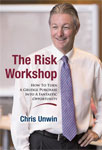CHRISISMS
A fortnightly pearl of wisdom to fast track your success
CHRISISM #87 - Asking The Right Questions
18 March 2019
In a number of previous “Chrisisms”, we have looked at the importance of asking questions during the client engagement questions (see references to previous “Chrisisms” below), but in this “Chrisism” I want to drill down specifically to the type of questions we should be asking.
In “Chrisism”#11 we looked at the importance of visualisation in the client engagement process. Given that we are in the habit of selling “intangibles” to our clients, it is essential that we enable our clients to visualise the benefits of what we are recommending. Similarly, we need to appreciate the importance of verbalisation in the client engagement process, and in order to get our clients to verbalise, we obviously need to be asking them questions. Whenever we are engaging with our clients, it is important to remember that we were given two ears and one mouth (see “Chrisism#54) and we should be using them in the same proportion as they were given to us i.e. we should be doing twice as much listening as talking. This requires us to ask our clients lots of questions. But asking our clients any old questions will not achieve the end result we are looking for, so the key to getting the desired result is to understand what type of questions we should be asking and what the structure of those questions should be. So let’s have a look at the type of questions we should be asking and the type of questions we should avoid asking. Ideally, the type of questions we should be asking are questions to which there is only one logical answer (which is the one we want to hear) or alternatively questions to which there may be more than one logical answer, either or any of which are fine by us. The type of questions we should avoid asking are those questions to which the answer could legitimately be “Yes” or “No”, one of which we do not want to hear. So examples of the questions we should be asking might be “In the event of you suffering a major illness or accident, where between 0% and 100% would you want your income to be replaced?”(as many of you would know, this is the very first question of my wants analysis) or “So would it more convenient for you to fund your personal protection package monthly or annually?” (Either way, they go ahead). Examples of questions we should not be asking in the same situations might be “In the event of you suffering a major illness or accident, how much income do you think you would need?” or “So do you want to go ahead with my recommendations?”. Spot the difference? So the important message to take away from the “Chrisism” is that just asking questions is not necessarily going to produce the result that you want. You need to really appreciate that it is the structure of the questions that is all important and the key to a good question is making sure it is easy to answer. Finally, there may be times in the engagement process where it needs to be largely one way traffic i.e. you will need to be doing most of the talking – for example during the introduction to the first meeting (see Chrisism#67). In this instance it is crucial that are constantly seeking your client’s buy-in or agreement with questions such as “Does that sound reasonable?” or “Are you comfortable with that?” as this will ensure that you keep them engaged and involved. If this “Chrisism” has been of value to you has provided some useful tips for your client engagement process, then imagine what a full day of input from me might achieve for you in your business – especially when the content of that day is specifically focused on the aspects of your client engagement that need to improve post Royal Commission! So if you want to get ahead of the game in the post Royal Commission environment, make sure you come along to my “How To Gain Trust & Build Stronger Client Relationships” Workshop in your capital city over the next couple of weeks. Click on the link below for the details in your capital city. |





